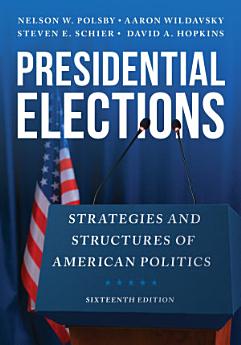Presidential Elections: Strategies and Structures of American Politics, Edition 16
জুলাই ২০২৩ · Bloomsbury Publishing PLC
ইবুক
328
পৃষ্ঠা
reportমূল্যাংকন আৰু পৰ্যালোচনা সত্যাপন কৰা হোৱা নাই অধিক জানক
এই ইবুকখনৰ বিষয়ে
Polsby and Wildavsky’s classic text, now updated by Stephen Schier and David Hopkins, argues that the institutional rules of the presidential nomination and election processes, in combination with the behavior of the mass electorate, structure the strategic choices faced by politicians in powerful and foreseeable ways. We can make sense of the decisions made by different political actors—incumbents, challengers, Democrats, Republicans, consultants, party officials, activists, delegates, journalists, and voters—by understanding the ways in which their world is organized by incentives, regulations, events, resources, customs, and opportunities. Thoroughly revised and updated, this Sixteenth Edition provides everything students need to know about presidential elections going into the 2024 cycle.
লিখকৰ বিষয়ে
Steven E. Schier is Dorothy H. and Edward C. Congdon Professor of Political Science Emeritus at Carleton College. He is the author or editor of 23 books including The Trump Effect: Disruption and Its Consequences in US Politics and Government and Polarized: The Rise of Ideology in American Politics, both with R&L.
David A. Hopkins is associate professor of political science at Boston College. He is the author of Red Fighting Blue: How Geography and Electoral Rules Polarize American Politics (Cambridge University Press), and Asymmetric Politics: Ideological Republicans and Group Interest Democrats (Oxford University Press). His political analysis has appeared in the New York Times, Washington Post, and Vox, and he is a contributing columnist at Bloomberg Opinion.
Nelson W. Polsby was Heller Professor of Political Science and past Director of the Institute of Governmental Studies at the University of California, Berkeley, where he taught American politics for forty years.
Aaron Wildavsky was Class of 1940 Professor of Political Science and Public Policy at the University of California, Berkeley, and founding dean of Berkeley's Graduate (now Goldman) School of Public Policy.
David A. Hopkins is associate professor of political science at Boston College. He is the author of Red Fighting Blue: How Geography and Electoral Rules Polarize American Politics (Cambridge University Press), and Asymmetric Politics: Ideological Republicans and Group Interest Democrats (Oxford University Press). His political analysis has appeared in the New York Times, Washington Post, and Vox, and he is a contributing columnist at Bloomberg Opinion.
Nelson W. Polsby was Heller Professor of Political Science and past Director of the Institute of Governmental Studies at the University of California, Berkeley, where he taught American politics for forty years.
Aaron Wildavsky was Class of 1940 Professor of Political Science and Public Policy at the University of California, Berkeley, and founding dean of Berkeley's Graduate (now Goldman) School of Public Policy.
এই ইবুকখনক মূল্যাংকন কৰক
আমাক আপোনাৰ মতামত জনাওক।
পঢ়াৰ নির্দেশাৱলী
স্মাৰ্টফ’ন আৰু টেবলেট
Android আৰু iPad/iPhoneৰ বাবে Google Play Books এপটো ইনষ্টল কৰক। ই স্বয়ংক্রিয়ভাৱে আপোনাৰ একাউণ্টৰ সৈতে ছিংক হয় আৰু আপুনি য'তে নাথাকক ত'তেই কোনো অডিঅ'বুক অনলাইন বা অফলাইনত শুনিবলৈ সুবিধা দিয়ে।
লেপটপ আৰু কম্পিউটাৰ
আপুনি কম্পিউটাৰৰ ৱেব ব্রাউজাৰ ব্যৱহাৰ কৰি Google Playত কিনা অডিঅ'বুকসমূহ শুনিব পাৰে।
ই-ৰীডাৰ আৰু অন্য ডিভাইচ
Kobo eReadersৰ দৰে ই-চিয়াঁহীৰ ডিভাইচসমূহত পঢ়িবলৈ, আপুনি এটা ফাইল ডাউনল’ড কৰি সেইটো আপোনাৰ ডিভাইচলৈ স্থানান্তৰণ কৰিব লাগিব। সমৰ্থিত ই-ৰিডাৰলৈ ফাইলটো কেনেকৈ স্থানান্তৰ কৰিব জানিবলৈ সহায় কেন্দ্ৰত থকা সবিশেষ নিৰ্দেশাৱলী চাওক।






